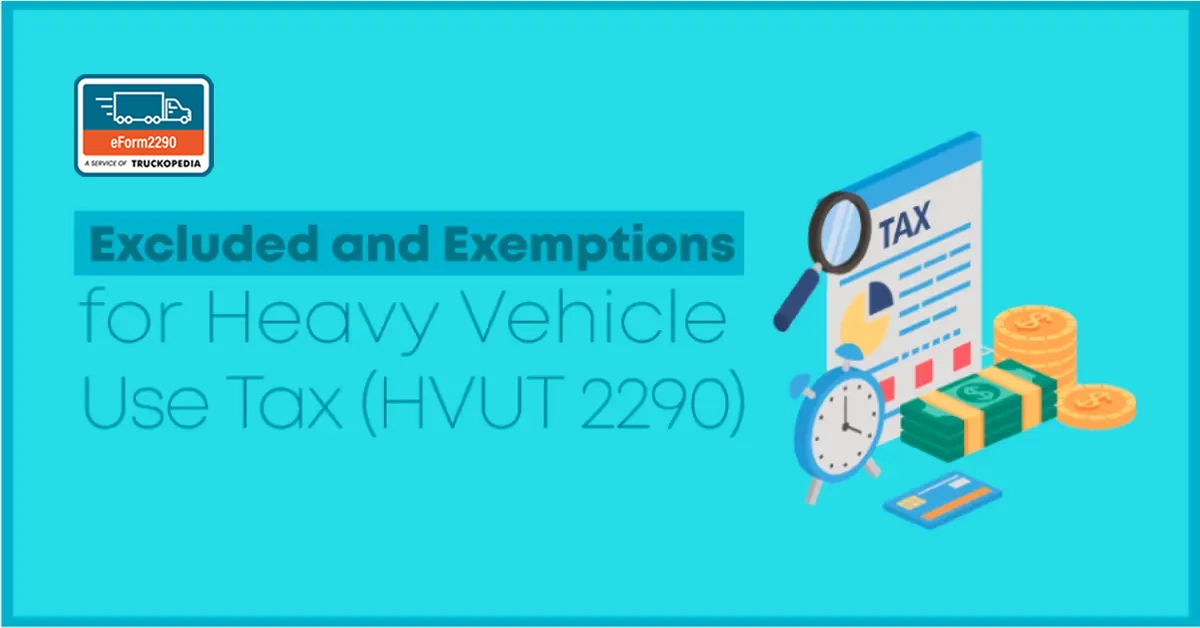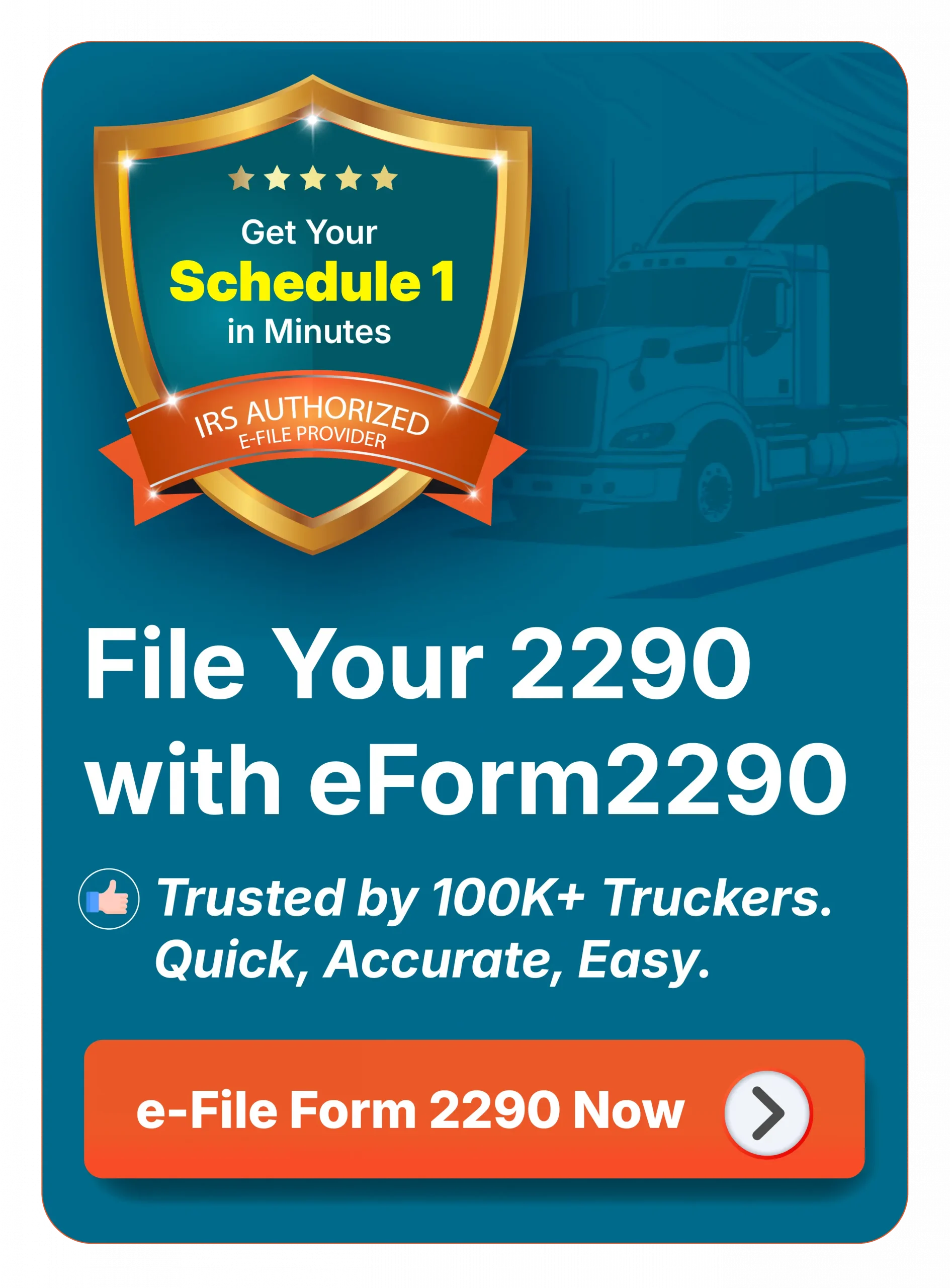Form 2290 Exemptions: Who Must File & Who is Exempt?

Before you file Form 2290, check if your truck qualifies for an exemption.
Filing IRS Form 2290 is a necessary compliance step for trucking companies that operate heavy vehicles with a gross weight of 55,000 pounds or more. Although the majority of heavy vehicle owners are required to file Form 2290, there are specific categories that may qualify for exemption based on their function, usage, or ownership structure.
Vehicles used for agricultural purposes, owned by government agencies, or operated by nonprofit organizations may qualify for a tax exemption under Form 2290. However, it's important to note that even if a vehicle is exempt from paying the Heavy Vehicle Use Tax (HVUT), the IRS still requires the form to be filed to report the exemption. In this blog, we’ll explain who must file Form 2290, outline the most common HVUT exemptions, and help you determine whether your vehicle qualifies.
Who must file Form 2290?
You must file IRS Form 2290 if you own a heavy highway vehicle that is registered or required to be registered—in your name under U.S. state law, the District of Columbia, or the laws of Canada or Mexico, and the vehicle has a taxable gross weight of 55,000 pounds or more.
The Heavy Vehicle Use Tax (HVUT) applies to these vehicles, and filing Form 2290 is required to receive your stamped Schedule 1, which serves as proof of payment and is necessary for registration or renewal with the DMV.
The HVUT tax year runs from July 1 through June 30 of the following year.
Determine when your Form 2290 is due
In siple terms, you must file Form 2290 and pay HVUT annually if:
- The vehicle is registered in your name.
- It’s intended for use on public highways (not just off-road or private property).
- It has a taxable gross weight of 55,000 pounds or more, including the truck, attached trailers, and maximum load capacity.
- It’s expected to travel more than 5,000 miles annually (7,500 miles for agricultural vehicles)
If your vehicle meets all the conditions, the IRS considers it a taxable vehicle, and you’ll need to file Form 2290 each year and pay the applicable HVUT tax .
Important: If the vehicle is registered under multiple names, the first person listed on the registration is responsible for filing Form 2290. Or If it’s operating under a dealer’s tag or permit, then the dealer must handle the filing and tax payment.
Even if your heavy vehicle is not expected to exceed 5,000 miles per year (or 7,500 miles for agricultural vehicles), you're still required to file Form 2290. In this case, your vehicle qualifies as a “suspended vehicle ”, meaning no tax is owed, but the IRS still requires the paperwork submission to consider the exemption.
Need help filing? Check out our step-by-step guide on how to file Form 2290.
Who is exempt from filing Form 2290?
While most heavy highway vehicles are subject to the Heavy Vehicle Use Tax (HVUT) and must be reported using IRS Form 2290 , certain vehicles may qualify for an exemption based on their use or design. These vehicles are still considered highway motor vehicles but are not required to pay the HVUT under specific conditions.
Below are some categories of vehicles that may be exempt from the Heavy Vehicle Use Tax:
1. Vehicles that are considered Highway Motor Vehicles
Certain highway motor vehicles are exempt from the Heavy Vehicle Use Tax (HVUT), provided they fulfill specific requirements. Here are some of the exempted vehicles based on the type, weight, usage, mileage, and purpose:
A. Vehicles that are suspended (light weight or low mileage)
Not all heavy vehicles are subject to the Heavy Vehicle Use Tax (HVUT). If your vehicle doesn't meet certain mileage or weight thresholds, it may qualify as a suspended vehicle , meaning it’s exempt from paying the tax, though you may still need to file Form 2290.
Light vehicles under 55,000 pounds
If the taxable gross weight is under 55,000 pounds, no Form 2290 filing or tax payment is required.
Vehicles that have low mileage (5,000 Miles or Less)
If a vehicle meets the weight threshold but drives 5,000 miles or less (or 7,500 miles for agricultural vehicles), it qualifies for a temporary exemption due to low mileage. However, the Form 2290 must still be filed to report the exemption, though no payment is due.
Important: You still need to file Form 2290 to notify the IRS and officially claim the exemption, but no payment is due.
B. Vehicles used for Agricultural purposes
Vehicles used exclusively for farming may also qualify for an exemption. To be considered:
- The vehicle must be registered in the name of the farmer or farming entity.
- It must be used strictly for agricultural purposes (such as hauling livestock, equipment, or crops).
- It should not travel more than 7,500 miles per year on public roads.
- At least 50% of its use must be directly related to farming, including transporting supplies or products between farms owned or leased by the taxpayer (not to markets or processing plants).
You must still file Form 2290 annually to claim the exemption, even if no tax is due.
C. Vehicles used for logging operations
Vehicles used exclusively for logging operations (hauling timber or forest products) may also be exempt from HVUT. To qualify:
- The vehicle must be registered under the operator’s or owner’s name.
- It must be used only for transporting harvested forest materials.
Logging vehicles used solely for transporting harvested forest products are taxed at a reduced HVUT rate. In some cases, they may qualify for exemptions, but appropriate classification and documentation are critical.
D. Vehicles used by the Government
Highway motor vehicles operated by the following entities are exempt from the HVUT and do not require filing Form 2290:
- The federal government
- The District of Columbia
- Any state or local government
E. Vehicles used by non-profit organizations
Vehicles owned and operated by qualified non-profit groups may also be exempt. These include:
- The American National Red Cross
- A nonprofit volunteer fire department, ambulance association, or rescue squad
- An Indian tribal government, but only when the vehicle is used in the exercise of essential tribal government functions
- A mass transportation authority created by statute and vested with powers typically held by state governments
F. Vehicles used by qualified organizations
Vehicles used primarily for blood collection by qualified organizations may qualify for an exemption provided:
- The vehicle is used by a qualified blood collector organization.
- It’s used at least 80% of the time (during the prior tax year) for collecting, storing, or transporting blood.
Important- New vehicles placed into service may also qualify, if the organization certifies that it reasonably expects to meet at least 80% usage for qualified blood collection purposes throughout the tax period.
G. Vehicles used by Mobile Machinery and specialized equipment
Certain vehicles built for non-transportation purposes and not intended for regular highway use are exempt from the HVUT. This category includes:
- Cranes, well-drilling rigs, asphalt spreaders, and similar machinery
- Vehicles permanently equipped with machinery used for construction, farming, mining, or other industrial operations.
Important- the vehicle must be used solely for its intended non-transportation purpose and should not be driven on public roads except incidentally.
2. Vehicles that are not considered Highway Motor Vehicles
Some vehicles are not considered “highway motor vehicles” under IRS definitions and are completely excluded and exempted from HVUT, regardless of use. The vehicles are -
A. Vehicles specially designed for Mobile Machinery for non-transportation functions
A self-propelled vehicle is not considered a highway vehicle if all the following conditions are met:
- The chassis is permanently mounted with machinery or equipment used for operations such as construction, manufacturing, drilling, mining, timbering, processing, farming, or similar activities.
- The operation of the machinery or equipment is unrelated to transportation on or off public highways.
- The chassis is specially designed only to function as a mobile carriage or mount for the machinery or equipment, including its power source, if applicable.
- The chassis cannot be used for other types of transportation without major structural changes (i.e., it’s not intended to carry other loads).
B. Vehicles specially designed for off-highway transportation
A vehicle isn’t considered a highway vehicle and is exempted if it’s specially built to transport a specific type of load primarily off the public highways due to its unique design. The vehicle's ability to transport a load on highways is substantially limited.
To determine if the vehicles are designed for off-highway transportation, the IRS considers:
- The size of the vehicle
- Whether it is licensed and subject to safety or operational regulations
- Whether it can transport loads at a sustained speed of at least 25 miles per hour on highways
It is not relevant whether the vehicle can carry heavier loads off-road than what is permitted on highways.
If the vehicle’s primary function is off-highway transportation, it qualifies for an exemption.
3. Vehicles exempt under state-specific regulations
In addition to the federal HVUT rules enforced by the IRS through Form 2290, some states have their own exemptions or regulations that might impact your overall tax responsibilities. These state-level rules can vary widely and may apply to specific vehicle types, industries, or operational purposes.
For instance, some states may:
- Exempt certain vehicle types based on how they are used or where they are operated.
- Provide different tax rates or deductions for specific vehicles or industries.
If you’re a trucking professional, it’s important to be informed and stay aware of these state-specific regulations, as they can impact your obligations to pay certain taxes or submit additional paperwork.


Frequently asked questions on Form 2290 exemptions?
1. Do I need to submit proof if my vehicle is tax-exempt from HVUT?
Yes. If your vehicle is exempt from paying the Heavy Vehicle Use Tax (HVUT), you must still submit a statement of exemption during registration renewal. This usually means providing a copy of your IRS Form 2290 showing that you’ve requested a suspension from the HVUT payment. Even tax-exempt vehicles must be reported to the IRS and properly documented with your registration authority.
2. What is the agriculture exemption on 2290?
The agriculture exemption on Form 2290 applies to vehicles used primarily for farming purposes. If an agricultural vehicle travels 7,500 miles or less during the tax period, it qualifies as a "suspended vehicle" and is exempt from the Heavy Vehicle Use Tax (HVUT). However, you are still required to file Form 2290 and indicate the vehicle as tax-suspended.
3. Do farmers have to file Form 2290?
Yes, farmers must file Form 2290 if they operate heavy vehicles on public highways. However, if the vehicle is used for farming and stays under 7,500 miles during the tax year, it may qualify for an agricultural exemption, reducing or eliminating the tax. Agricultural vehicles also benefit from lower tax rates compared to other commercial trucks.


4. Are farm trucks tax-exempt?
Farm trucks may qualify for a tax exemption under Form 2290 if they are used primarily for agricultural purposes and travel 7,500 miles or less on public highways during the tax year. These vehicles are considered "suspended" for tax purposes, meaning no HVUT is due, but you still need to file Form 2290 and indicate the exemption. If the mileage limit is exceeded, the full tax applies.
5. What is considered a taxable vehicle for Form 2290?
A taxable vehicle is any truck, truck tractor, or bus that’s registered and used on public highways with a gross weight of 55,000 pounds or more. These vehicles are subject to the Heavy Vehicle Use Tax (HVUT). Lighter vehicles like pickups, vans, and panel trucks usually don’t qualify because they fall below the weight threshold.
Any road that’s open for public use—whether federal, state, or local—is considered a public highway. So, even driving your new heavy truck home from the dealership on a public road counts as its first taxable use.
6. What is a taxable highway motor vehicle?
A taxable highway motor vehicle is any self-propelled vehicle designed to carry loads on public roads and has a taxable gross weight of 55,000 pounds or more. It must be registered (or required to be registered) in your name under U.S., District of Columbia, Canadian, or Mexican laws when first used during the tax period. Common examples include trucks, truck tractors, and buses. Smaller vehicles like vans, pickup trucks, and panel trucks are generally not taxed under Form 2290, as they usually weigh less than 55,000 pounds.
For tax purposes, a vehicle includes the main structure—the chassis or the chassis and body together—but not the load it carries. It doesn’t matter if the vehicle is built to carry special loads like passengers, furniture, or cargo. Even if it has special equipment permanently attached for work off the highway, it is still considered a highway motor vehicle unless it falls under specific exceptions.
7. Can I get a tax credit or refund for an exempt vehicle under Form 2290?
Yes, in certain cases, you may be eligible for a tax credit or refund even if your vehicle is exempt from HVUT. For example, if a vehicle changes from exempt to taxable status mid-year, you might owe a prorated tax. Likewise, if you've overpaid due to a filing error or sold the vehicle, you could qualify for a refund. The process can be complex, so it’s best to consult a tax professional, such as eForm2290, or contact the IRS for guidance.





